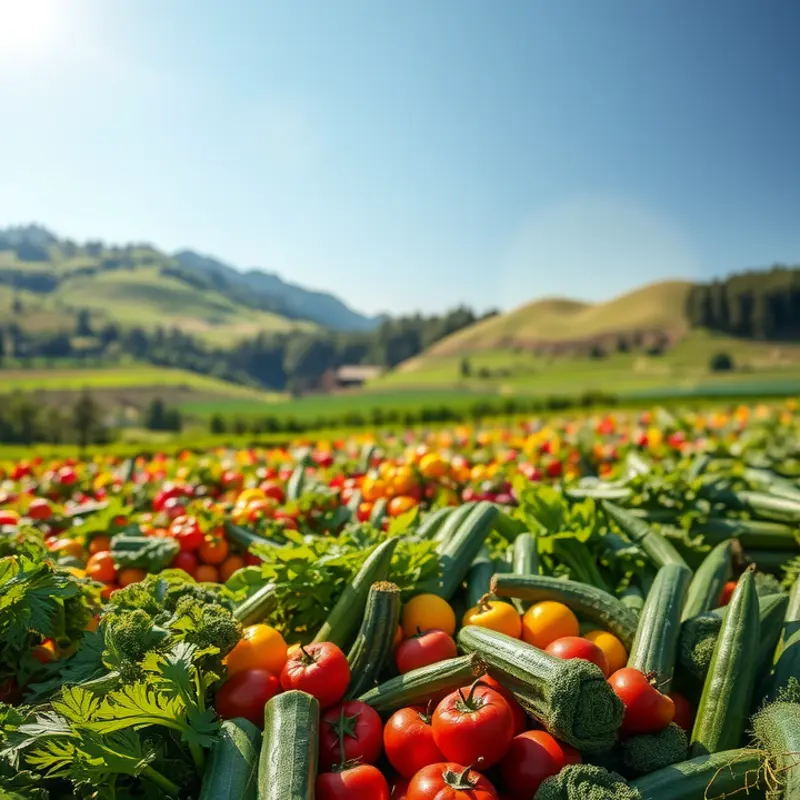In an age of heightened environmental awareness, making conscious food choices is more crucial than ever. A diet that prioritizes ecological wellness can significantly impact the earth and our health. By embracing sustainable practices, individuals can contribute to reducing carbon footprints, preserving biodiversity, and supporting local economies while enjoying nutrient-rich foods. This journey toward sustainability is both attainable and rewarding, encouraging a deeper connection with nature and our food sources.
The Foundations of a Sustainable Diet

The principles of a sustainable diet revolve around thoughtful choices that nurture both personal well-being and ecological balance. A primary focus is shifting towards plant-based foods. These foods are resource-efficient compared to animal-based products. For example, producing plant-based proteins like legumes and grains requires significantly less water and land. This shift can reduce the strain on natural resources and decrease greenhouse gas emissions, aligning with a more sustainable lifestyle.
Local sourcing is another crucial element. By choosing foods grown nearby, we support local economies and minimize the carbon footprint associated with long-distance transportation. Furthermore, local foods tend to be fresher and often require fewer preservatives. Embracing seasonal produce can connect us more intimately with nature’s cycles while reducing the environmental toll of forced growing environments.
To explore how local food choices protect our planet’s water resources, consider visiting food choices and water protection.
Minimizing waste complements these dietary practices. Reducing food waste begins with planning meals carefully, buying only what we need, and understanding food storage techniques. By avoiding over-purchasing and learning effective preservation methods, like properly storing nuts and seeds and utilizing leftovers creatively, we can significantly cut down on food waste. These steps not only save resources but also reduce the demand on landfills, where decomposing food produces methane, a potent greenhouse gas.
Implementing these strategies fosters a holistic approach to eating that acknowledges the interdependence of human and environmental health. Small changes in daily habits can ripple outward, contributing to broader ecological wellness. With these sustainable choices, we hold the power to enhance our health and support a thriving planet.
Practical Steps to Implement Eco-Friendly Food Choices

To create a sustainable diet that benefits both our health and the environment, integrating eco-friendly food choices into daily life is vital. Small, intentional changes in how we select, store, and dispose of food can collectively make a significant impact. Here are some practical strategies for transitioning to an eco-friendly diet.
Focusing on seasonal produce is one effective way to start. By prioritizing fruits and vegetables harvested in their natural season, we not only enjoy fresher, tastier options, but also reduce the carbon footprint associated with long-distance transportation. Seasonal eating often supports local farmers, strengthening community resilience.
Next, consider reducing food waste. An estimated one-third of all food produced globally is wasted, contributing to unnecessary environmental strain. Simple actions like planning meals more effectively, understanding food storage (read more about nut and seed storage), and using leftovers creatively can significantly curb waste. Proper storage extends the freshness of your groceries, reducing the possibility of spoilage.
Choosing plant-based foods more often is another sustainable practice. Plant-based diets typically require fewer resources and result in lower emissions compared to meat-heavy diets. Even small shifts, like participating in “Meatless Mondays,” encourage sizeable reductions in environmental impact. Many plant sources provide ample nutrition, further supported by exploring varied ingredients.
Moreover, mindful consumption of animal products is critical. Seek out certified foods that prioritize animal welfare, ensuring ethical practices in their production. These choices not only favor ecological sustainability but also reflect an awareness of humane treatment.
Supporting local farmers markets is beneficial too. Local markets offer fresh, seasonal products with shorter supply chains. By shopping locally, we cut down on the environmental toll of transportation while nurturing community economies. Making continued efforts to buy from these sources fosters a culture of sustainability.
To further champion eco-friendly practices, become more conscious of packaging. Opt for products with minimal or biodegradable packaging, and bring reusable bags when shopping. Reducing reliance on single-use plastics minimizes pollution in oceans and landfills, crucial for ecological health.
Incorporating these strategies helps move toward a more sustainable lifestyle. Each change contributes to environmental wellness, encouraging broader societal shifts toward sustainability. By making eco-friendly food choices a part of our daily lives, we protect our planet while enriching our personal health.
Final words
Choosing a diet focused on ecological wellness not only benefits personal health but also the planet’s future. Every meal is an opportunity to support sustainable practices, combat climate change, and promote biodiversity. By prioritizing plant-based foods, sourcing locally, and minimizing food waste, individuals can make a profound difference. Embrace these principles and inspire others to do the same, creating a ripple effect of positive change. Together, let’s cultivate a future where both humans and the earth thrive.








